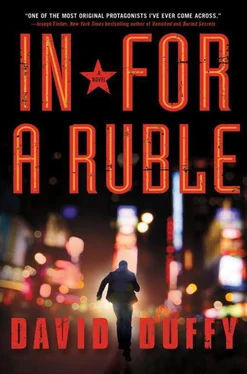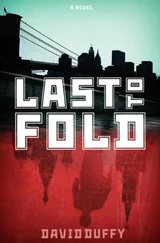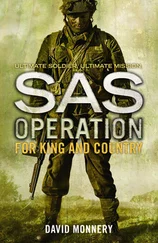“Sounds like competition to me.”
“I have no problem with competition. It makes my job more difficult, but that’s the nature of capitalism. My problem is theft.”
Foos grunted his approval—we were finally somewhere.
“My business is all computers,” Leitz said. “They run the models, access the markets for information, crunch the numbers, identify opportunities. Everybody works this way. The amount of information to be gathered and processed is way more than any individual or group of individuals could handle. The competitive advantage therefore is in the modeling and the software—and the cost of capital.”
“Somebody has to provide the modeling and software. Or have the computers learned to do that themselves?”
He laughed. “No, that’s where we mortals still add value, at least for the time being. But we’re hostage to the electronic executioners of the strategies we develop. We can’t operate without them. So we go to substantial lengths to make sure they’re secure. A few months ago, we were subjected to an attempted break-in, electronic.”
“Brute-force attack,” Foos said. “Somebody used their own computer to run the possible password combinations for one of Sebastian’s employees. Could’ve worked, but fortunately he changes passwords every week and the bad guy’s computer was a little slow. Whoever it was tried again, twice, but I suggested some improvements in encryption and a few other areas, and they didn’t get very far. Things should stay copasetic in the near term, but there ain’t no panaceas in this business.”
“This related to the TV bid?”
“I’m assuming it is.”
“Anything like this happen before?”
“No.
“Any idea who’d try it?”
“Another bidder, or prospective bidder. Lots of rumors out there. Competitor, maybe. Disgruntled investor. Someone with a grudge against hedge funds. Plenty of those out there too. Maybe just a hacker.”
“No hackers anymore who aren’t in it for profit,” Foos said.
“You do anything recently to piss anyone off?” I asked.
“Like make them take their money back? No.” He laughed.
“Tell me about the TV bid.”
His face darkened. “What do you mean?”
“Why you’re in it. This is hardly a bet—sorry, trade—based on market inefficiencies.”
The darkness lifted, replaced by inquisitiveness. “Don’t take this the wrong way, but how much do you know about capital markets?”
“Marx identified three essential elements of capitalism—capital, labor, and markets. I’ve studied their interrelationships, albeit perhaps from a different perspective than yours.”
He chuckled. “Fair enough. But Marx left one element out—cash.”
“I appreciate cash. It’s why I don’t keep much money in the markets.”
He laughed again. “Good for you. Then you’ll understand where I’m coming from. A different perspective, as you say. Everyone focuses on TV networks as businesses in long-term decline. Competition from cable channels, the Internet, video games, not to mention good old evolving demographics. No question about it, long-term outlook sucks. That’s a technical term. Not a business most companies, especially growth-oriented public companies, want to be in anymore.”
“So?”
“Cash. It’s still a cash-rich business. You have any idea how much cash one network throws off in a year? Billions. Now think about two. Then think about two, merged, redundancies and overlaps removed, market share enhanced, if only because there are now three where there were four. In cash flow terms, one plus one equals three, maybe three and a half. You got cash like that, you got options, in a capitalist way of thinking, of course.”
“In any way of thinking. I’m still keeping most of my money in the mattress. How come nobody else figured this out?”
“I’m sure they have, especially now that I’ve shown a spotlight on it. That’s why I expect competition. Cash flow is a commodity, like any other. The difference between success and failure in this deal is price, how much you pay to acquire that cash flow. I think my analysis is better, more productive, than anyone else’s is likely to be. If you were getting into the game, it would be helpful to know what the other guy’s planning to do, wouldn’t it?”
“So you think that’s what’s going on?”
“Timing suggests it is. So does the amount of money involved. It’s enough to attract someone with the kind of resources this guy seems to have.”
“And you want me to find this guy?”
“That would be ideal, of course, but I’m not naïve. I’m more concerned about security. Foos says we’re secure, and I believe him. He also says, no panaceas, as you just heard. I want you to put yourself in this guy’s shoes and see if you can find a way in.”
I still didn’t want the job. Foos was staring straight at me, all but imploring—take it, you need something to do. He was trying to kill two birds with one stone—help Leitz and give me something to occupy a troubled mind. Well-meaning friends can be a real pain in the ass.
Nowhere near the pain I’d been in since Moscow, though. I’d gone in December hoping it would change my mood. Not much traction before the family roof caved in once again.
I got reacquainted—more accurately, acquainted—with my son, Aleksei, as we started to fill in the thirty years since the time I’d left him and my ex-wife. “Abandoned” is his word, “thrown out” is mine, but we’ve agreed to disagree. That we found each other was fate at work, especially since Polina and I didn’t talk after the split, and I’d moved to New York back in 1992. There was a price to be paid, of course—if you’re Russian there’s always a price—in this case, the death of his mother. I didn’t feel guilt or sadness. She was a tortured soul, and she’d done more than her share of harm—mostly to me. I didn’t see why he should either, since she truly had abandoned him, but try telling that to a son about his mother.
This was all maybe manageable, although Aleksei wasn’t making it easy. My attempts to find some kind of roadmap to rapport were running into a major roadblock—the Cheka, known today as the FSB, known to most as the KGB (its longest running incarnation), known previously by multiple names and acronyms, but all anyone needs to know is that they all stand for state security. The specific problem was my connection to the Cheka, my employer for twenty years, which my son presumed was as strong as ever, despite ample evidence to the contrary. That made the kick in the gut Sasha delivered, the one I was still trying to work through, all the more devastating.
I’ve been doing long-distance research for years into an unknown past—wondering if it was truly unknowable. The Gulag, where I’d grown up, did a few things well. One was eviscerate its victims’ lives. Another was keep records. The records still exist, in the archives of the Cheka. I’ve been working, in secret, with an archivist I know only as Sasha, who’s helped many people uncover their pasts. My mother’s history was relatively easy to reconstruct, from what I’d been told as a child and from Gulag documents. There was a brief period in the chaos of the early 1990s when things opened up, even at Lubyanka, and Sasha was able to unearth a little information about my presumed father, then the Cheka flexed its still considerable muscle, and the doors to the archives slammed shut. Numerous questions about my parentage remained unanswered. Sasha had managed a breakthrough last summer, but he and the new information ran afoul of Lachko Barsukov. Before I figured out that Lachko wasn’t my only Barsukov nemesis, Sasha had to go underground. When he surfaced and felt safe, I booked a flight to Moscow. I had a bad feeling about what awaited me there, and I wasn’t wrong, but I wanted out of New York, away from Victoria’s memory. For some reason, I keep thinking distance can dull the pain of the past.
Читать дальше












